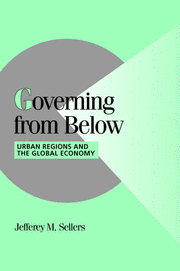5 - THE MAKING OF URBAN REGIMES
Published online by Cambridge University Press: 14 January 2010
Summary
Beyond governmental institutions, beyond electoral politics, even beyond interlocal governance, urban governance depends on relations with the economy and society. These relations consist of more than the loose, contingent coalitions that pervaded accounts by pluralists like Dahl. Rather than simply policies backed by stable coalitions among governments, electoral coalitions or other actors, governing coalitions in urban settings from Freiburg to Rennes to Madison regularly take the form of institutionalized arrangements between governments, businesses and other social forces. Increasingly, urban analysts, drawing on a term that traces its origins to the dawn of political science, have characterized the nested arrangements for governance in cities and urban regions as urban regimes. As at the national and international levels, the term highlights both the stability and the significance of a governing coalition. An urban regime can either brake or accentuate economic influences from without and can alter or reinforce from below the decisions of national authorities. Business and its organized representatives are critical to these formations, but local social and neighborhood movements have increasingly played a role in urban regimes as well. At nearly every step, as infrastructures embedded at higher levels influence what urban regimes can and cannot do, institutions linked to the nation-state have continued to pervade regime politics.
Even as these emergent forms of urban governance recall the localized arrangements of medieval Europe or ancient Greece, it would be a mistake to identify contemporary regimes completely with the “city-states” of earlier eras. Rather, as analysts of urban governance have recognized, urban regimes continue to nest in the translocal systems of both capitalism and national states.
- Type
- Chapter
- Information
- Governing from BelowUrban Regions and the Global Economy, pp. 290 - 373Publisher: Cambridge University PressPrint publication year: 2002

